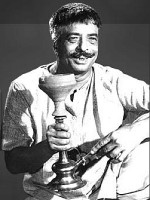Rajinder Singh Bedi is a Actor, Director, Scriptwriter, Producer and Additional Dialogue Indian born on 1915 at Sialkot (Pakistan)
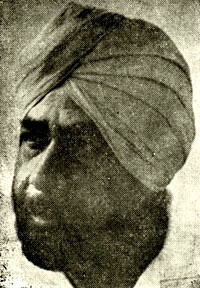
Rajinder Singh Bedi (Punjabi: ਰਾਜਿੰਦਰ ਸਿੰਘ ਬੇਦੀ, Urdu: راجندر سنگھ بیدی, Hindi: राजिंदर सिंह बेदी ; 1915–1984) was a progressive Urdu writer, playwright and a Hindi film director, screenwriter and dialogue writer.
Some of his best work as a dialogue writer can be seen in Hrishikesh Mukherjee's films Abhimaan, Anupama and Satyakam; and Bimal Roy's Madhumati. As a director he is most known for his films Dastak (1970), starring Sanjeev Kumar and Rehana Sultan and Phagun (1973), starring Dharmendra, Waheda Rehman, Jaya Bhaduri and Vijay Arora.
Rajinder Singh Bedi is considered one of the greatest 20th century progressive writers of Urdu fiction, and second most prominent Urdu fiction writer, after Saadat Hasan Manto, and like Manto he is most known for his "disturbing" Partition of India tales.
Rajinder Singh Bedi was born near Sialkot, Punjab, Pakistan. He spent his early years in Lahore, Pakistan, where he received his education in Urdu, as it was common to most Punjabi families, though he never graduated from a college. After Partition his other family members settled in Fazilka, on the Indian side of Punjab.
Career
His first short story "Maharani ka Tohfa" won the best Short Story of the Year, given by Adabi Dunya, a prominent Urdu monthly magazine, published from Lahore.
He started his career working as a clerk at Lahore Post Office in 1933. In 1941 he joined the Urdu section of All India Radio, Lahore. While working at All India Radio he wrote many plays, including his famous drama Khawaja Sara and Nakl-i-Makaani, which he later adapted into his film Dastak in 1970.
His first collection of short stories, Daan-O-Daam (The Catch), featuring his prominent story "Garam Coat" (Warm Coat) was published in 1940. In 1942, he published his second collection of short stories, Grehan (The Eclipse).
In 1943, he joined Maheshwari Films, a small Lahore film studio, although after one and half years he returned to All India Radio and was posted to Jammu, where he worked until 1947.
By the time of Partition Rajinder Singh Bedi had published numerous more short stories, and had made a name for himself as a prolific writer.
His Urdu novel, Ek Chadar Maili Si, translated into English as "I Take This Woman", received the Sahitya Akademi Award in 1965. The book was later translated into Hindi, Kashmiri and Bengali.
Spanning fifty years and 72 short stories, his literary career was marked with versatility and represented the finest creative writing in Urdu literature. His stories "Garm Kot" and "Lajvanti" are considered among the masterpieces of Urdu short story. His later collections of short stories were "Kokh Jali" and "Apne Dukh Mujhe Dedo" and a collection of plays "Saat Khel".
Films
After the partition of India in 1947, he moved to Bombay, and started working with D. D. Kashyap and got his first screen credit for dialogue, in the 1949 film Badi Bahen, although he received greater recognition for his second film Daag, a 1952 film.
In 1954, he joined with Amar Kumar, Balraj Sahni, Geeta Bali and others to create a new company called Cine Cooperative. In 1955, it produced its first film, Garam Coat. Based on Bedi's short story Garam Coat, starring Balraj Sahni and Nirupa Roy, and directed by Aman Kumar, the film gave Bedi the chance to write an entire screenplay.
Their second film, Rangoli (1962), starring Kishore Kumar, Vyjayantimala, and Durga Khote, was also directed by Amar Kumar.
He continued to display his range in dialogue writing styles in many classic Hindi films, starting with Sohrab Modi's Mirza Ghalib (1954), Bimal Roy's Devdas (1955), and Madhumati (1958); Amar Kumar and Hrishikesh Mukherjee's films, Anuradha (1960), Anupama (1966), Satyakam (1969) and Abhimaan (1973).
But his greater accomplishment in films has been pioneering straight forward and down-to-earth dialogues in Hindi cinema, which were known for its melodrama and extreme rhetoric content.
He made his directorial debut with Hindi classic Dastak (1970), starring Sanjeev Kumar and Rehana Sultan, with music by Madan Mohan, and in the following decade he directed three more films, Phagun (1973), Nawab Sahib (1978) and Aankhin Dekhi (1978).
His writing was known for its sensitivity and earthiness. His novella Ek Chadar Maili Si was made into a film in Pakistan, Mutthi Bhar Chawal (1978) and later in India, as Ek Chadar Maili Si (1986), a rare distinction for an Indian author to have his work picturised on both sides of the border.
His son Narender Bedi was also a Film director and the maker of films like Jawani Diwani (1972), Benaam (1974), Rafoo Chakkar (1975), Sanam Teri Kasam, he died in the 1982. Two years later in 1984, Rajinder Singh Bedi also died, in Bombay.
His short story Lajwanti was made into a telefilm, by Neena Gupta in 2006.
In his memory, the Government of Punjab has started a "Rajinder Singh Bedi Award" in the field of Urdu Literature.
Source : Wikidata
Rajinder Singh Bedi

Birth name Rajinder Singh Bedi
Nationality Inde
Birth 1915 at Sialkot (Pakistan)
Death 1984 (at 69 years) at Mumbai (Inde)
Awards Sahitya Akademi Award, Padma Shri, Filmfare Awards
Nationality Inde
Birth 1915 at Sialkot (Pakistan)
Death 1984 (at 69 years) at Mumbai (Inde)
Awards Sahitya Akademi Award, Padma Shri, Filmfare Awards
Rajinder Singh Bedi (Punjabi: ਰਾਜਿੰਦਰ ਸਿੰਘ ਬੇਦੀ, Urdu: راجندر سنگھ بیدی, Hindi: राजिंदर सिंह बेदी ; 1915–1984) was a progressive Urdu writer, playwright and a Hindi film director, screenwriter and dialogue writer.
Some of his best work as a dialogue writer can be seen in Hrishikesh Mukherjee's films Abhimaan, Anupama and Satyakam; and Bimal Roy's Madhumati. As a director he is most known for his films Dastak (1970), starring Sanjeev Kumar and Rehana Sultan and Phagun (1973), starring Dharmendra, Waheda Rehman, Jaya Bhaduri and Vijay Arora.
Rajinder Singh Bedi is considered one of the greatest 20th century progressive writers of Urdu fiction, and second most prominent Urdu fiction writer, after Saadat Hasan Manto, and like Manto he is most known for his "disturbing" Partition of India tales.
Biography
Early lifeRajinder Singh Bedi was born near Sialkot, Punjab, Pakistan. He spent his early years in Lahore, Pakistan, where he received his education in Urdu, as it was common to most Punjabi families, though he never graduated from a college. After Partition his other family members settled in Fazilka, on the Indian side of Punjab.
Career
His first short story "Maharani ka Tohfa" won the best Short Story of the Year, given by Adabi Dunya, a prominent Urdu monthly magazine, published from Lahore.
He started his career working as a clerk at Lahore Post Office in 1933. In 1941 he joined the Urdu section of All India Radio, Lahore. While working at All India Radio he wrote many plays, including his famous drama Khawaja Sara and Nakl-i-Makaani, which he later adapted into his film Dastak in 1970.
His first collection of short stories, Daan-O-Daam (The Catch), featuring his prominent story "Garam Coat" (Warm Coat) was published in 1940. In 1942, he published his second collection of short stories, Grehan (The Eclipse).
In 1943, he joined Maheshwari Films, a small Lahore film studio, although after one and half years he returned to All India Radio and was posted to Jammu, where he worked until 1947.
By the time of Partition Rajinder Singh Bedi had published numerous more short stories, and had made a name for himself as a prolific writer.
His Urdu novel, Ek Chadar Maili Si, translated into English as "I Take This Woman", received the Sahitya Akademi Award in 1965. The book was later translated into Hindi, Kashmiri and Bengali.
Spanning fifty years and 72 short stories, his literary career was marked with versatility and represented the finest creative writing in Urdu literature. His stories "Garm Kot" and "Lajvanti" are considered among the masterpieces of Urdu short story. His later collections of short stories were "Kokh Jali" and "Apne Dukh Mujhe Dedo" and a collection of plays "Saat Khel".
Films
After the partition of India in 1947, he moved to Bombay, and started working with D. D. Kashyap and got his first screen credit for dialogue, in the 1949 film Badi Bahen, although he received greater recognition for his second film Daag, a 1952 film.
In 1954, he joined with Amar Kumar, Balraj Sahni, Geeta Bali and others to create a new company called Cine Cooperative. In 1955, it produced its first film, Garam Coat. Based on Bedi's short story Garam Coat, starring Balraj Sahni and Nirupa Roy, and directed by Aman Kumar, the film gave Bedi the chance to write an entire screenplay.
Their second film, Rangoli (1962), starring Kishore Kumar, Vyjayantimala, and Durga Khote, was also directed by Amar Kumar.
He continued to display his range in dialogue writing styles in many classic Hindi films, starting with Sohrab Modi's Mirza Ghalib (1954), Bimal Roy's Devdas (1955), and Madhumati (1958); Amar Kumar and Hrishikesh Mukherjee's films, Anuradha (1960), Anupama (1966), Satyakam (1969) and Abhimaan (1973).
But his greater accomplishment in films has been pioneering straight forward and down-to-earth dialogues in Hindi cinema, which were known for its melodrama and extreme rhetoric content.
He made his directorial debut with Hindi classic Dastak (1970), starring Sanjeev Kumar and Rehana Sultan, with music by Madan Mohan, and in the following decade he directed three more films, Phagun (1973), Nawab Sahib (1978) and Aankhin Dekhi (1978).
His writing was known for its sensitivity and earthiness. His novella Ek Chadar Maili Si was made into a film in Pakistan, Mutthi Bhar Chawal (1978) and later in India, as Ek Chadar Maili Si (1986), a rare distinction for an Indian author to have his work picturised on both sides of the border.
His son Narender Bedi was also a Film director and the maker of films like Jawani Diwani (1972), Benaam (1974), Rafoo Chakkar (1975), Sanam Teri Kasam, he died in the 1982. Two years later in 1984, Rajinder Singh Bedi also died, in Bombay.
His short story Lajwanti was made into a telefilm, by Neena Gupta in 2006.
In his memory, the Government of Punjab has started a "Rajinder Singh Bedi Award" in the field of Urdu Literature.
Usually with
Filmography of Rajinder Singh Bedi (28 films)
Actor
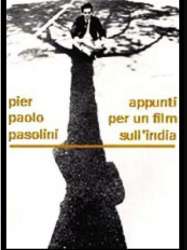
Notes for a Film in India (1968)
Directed by Pier Paolo Pasolini
Genres Documentary
Themes Documentaire sur une personnalité
Actors Khwaja Ahmad Abbas, Pier Paolo Pasolini, Rajinder Singh Bedi
Roles Self
Rating70%





En Inde, Pasolini pose la question : « Donneriez-vous votre corps pour nourrir des tigres qui meurent de faim ? ».
Director

Phagun (1973)
, 2h16Directed by Rajinder Singh Bedi
Actors Waheeda Rehman, Dharmendra, Jaya Bachchan, Vijay Arora, Om Prakash
Rating70%





The film has a Maharashtrian backdrop with many characters speaking Marathi dialogs and in Marathi costumes. Shanta Damle (Waheeda Rehman), who belongs to rich Maharashtrian business family, falls in love and marries, a not so well off writer, Gopal (Dharmendra), much to her family's dismay.
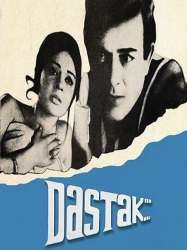
Dastak (1970)
, 2h20Directed by Rajinder Singh Bedi
Origin Inde
Genres Drama, Musical
Themes Films about sexuality, Erotic films, Films about prostitution, Films based on plays, Erotic thriller films
Actors Sanjeev Kumar, Rehana Sultan, Anju Mahendru, Kamal Kapoor, Manmohan Krishna Chadha
Rating73%





The film was known for its unusual story line set in a red light area. A newlywed couple, Hamid (Sanjeev Kumar) and Salma (Rehana Sultan), unwittingly rent a flat, and thus begins their daily turmoil at the knocks (dastak) on their door. The previous occupant was Shamshad Begum (Shakeela), a famous mujrewali (nautch girl).
Scriptwriter

Ek Chadar Maili Si (1986)
Actors Hema Malini, Rishi Kapoor, Kulbhushan Kharbanda, Poonam Dhillon, Dina Pathak, A. K. Hangal
Roles Writer
Rating70%





Rano (Hema Malini), a feisty woman, lives in a village with her drunkard husband, Triloka (Kulbhushan Kharbanda), and her two children. Her mother-in-law, Zinda (Dina Pathak), constantly berates her for her inadequate dowry, even years after her marriage. Only her father-in-law, Hazur Singh (A. K. Hangal), an old blind man, is kind towards her but can do little. The only member of the family who can save her from the wrath of Triloka is her brother-in-law, Mangal (Rishi Kapoor). One night Triloka drops a young girl left behind at the railway station to a nearby inn. The next morning when the girl is found raped, her enraged brother kills Triloka in rage. After her husband is murdered, Rano is forced to marry her brother-in-law, Mangal, who is a good ten years younger than her and whom she had looked upon as a child, through the ceremony of chadar daalna (Niyoga). The film derives its name from it. Raji(Poonam Dhillon) a gypsy girl, plays Mangal's love interest, who leaves the scene once he gets married.

Amaanat (1977)
Genres Drama
Actors Manoj Kumar, Sadhana Shivdasani, Balraj Sahni, Joginder, Mehmood Ali, Rehman
Roles Dialogue
Rating57%






Phir Kab Milogi (1974)
Directed by Hrishikesh Mukherjee
Genres Drama, Romance
Actors Mala Sinha, Biswajit Chatterjee, Deven Varma, Abhi Bhattacharya, David Abraham, Sujatha
Rating61%





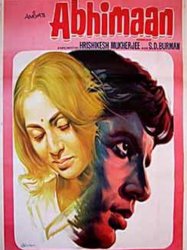
Abhimaan (1973)
, 2h2Directed by Hrishikesh Mukherjee
Genres Drama, Romance
Actors Amitabh Bachchan, Jaya Bachchan, Asrani, Bindu, David Abraham, A. K. Hangal
Rating77%





Subir (Amitabh Bachchan) is a professional singer whose career is soaring. He does not plan to marry—until he meets Uma (Jaya Bhaduri), a sweet village girl who also sings. Subir falls in love with Uma and marries her. He returns to Mumbai with his new bride. Subir continues as a singer and also fosters Uma's singing career. His career falters, however, just as Uma's singing career begins to thrive. Eventually, she becomes more famous than her husband, sparking jealousy from Subir. His pride and jealousy tear the marriage apart. The question becomes whether Subir can overcome his jealousy.

Jwala (1971)
Genres Action
Actors Sunil Dutt, Madhubala, Sohrab Merwanji Modi, Pran Krishan Sikand, Goga Kapoor, David Abraham
Roles Writer
Rating45%






Dastak (1970)
, 2h20Directed by Rajinder Singh Bedi
Origin Inde
Genres Drama, Musical
Themes Films about sexuality, Erotic films, Films about prostitution, Films based on plays, Erotic thriller films
Actors Sanjeev Kumar, Rehana Sultan, Anju Mahendru, Kamal Kapoor, Manmohan Krishna Chadha
Roles Writer
Rating73%





The film was known for its unusual story line set in a red light area. A newlywed couple, Hamid (Sanjeev Kumar) and Salma (Rehana Sultan), unwittingly rent a flat, and thus begins their daily turmoil at the knocks (dastak) on their door. The previous occupant was Shamshad Begum (Shakeela), a famous mujrewali (nautch girl).
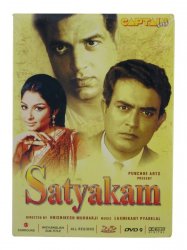
Satyakam (1969)
Directed by Hrishikesh Mukherjee
Genres Drama
Actors Dharmendra, Ashok Kumar, Sarika, Ashok Kumar, Sharmila Tagore, Sanjeev Kumar
Rating82%





The story begins in 1946, just a year before India’s independence. People's minds are filled with a genuine anticipation of positive change. For some like Satyapriya Acharya (Dharmendra)India’s forthcoming independence spells a paradigm shift towards a sympathetic-rationalism that would take India’s populace from rags to riches. Satyapriya's conviction is guided by his ascetic grandfather 'Daddaji' Satyasharan Acharya (Ashok Kumar)'s world views, whose pursuit of truth has led to him living in isolation in a Gurukula studying religious philosophy and observing a variety of rigid rituals.

Mere Hamdam Mere Dost (1968)
Genres Drama, Thriller
Actors Sharmila Tagore, Dharmendra, Rehman, Mumtaz, Om Prakash, Achala Sachdev
Roles Dialogue
Rating69%





Sunil (Dharmendra) lives with his mother and sister a middle-class life in Delhi. He works for Chopra & Co., Chartered Accountants. He comes across a beautiful woman posing for a painting, and thinks she is poor and needy, and gives her a tip. The woman's name is Anita, and both are attracted to each other. Sunil and Anita intend to marry, and Sunil even introduces Anita to his mother. One day when attending a party, Sunil is shocked to learn that Anita is a multi-millionaire. Stunned at this deception, he swears he will have nothing to do with her. When Anita attempts to sooth things over, Sunil does cool down. It is then he finds out that Anita's dad, who is serving time, had killed his father, and that Anita mother is still alive, after making her living as a former prostitute.

Baharon Ke Sapne (1967)
Directed by Nazir Hussain, Nasir Husain
Genres Drama
Actors Rajesh Khanna, Asha Parekh, Prem Nath, Rajendra Nath, Madan Puri, Kanu Roy
Roles Dialogue
Rating73%






Anupama (1966)
, 2h28Directed by Hrishikesh Mukherjee
Genres Drama
Actors Sharmila Tagore, Dharmendra, Deven Varma, Shashikala, David Abraham, Tarun Bose
Roles Dialogue
Rating73%





Mohan Sharma (Tarun Bose), a successful businessman in Bombay, marries late in life, and is leading a happy married life, when, unfortunately, his wife dies during childbirth leaving behind a young daughter, Uma (Sharmila Tagore), whom he cannot bear to see, except when he is drunk! Naturally, the daughter grows up all by herself and becomes highly introvert. As time passes, Mohan Sharma's health starts failing due to overwork and alcoholism; doctors suggest change of weather to a hill-station, Mahabaleshwar.

Mere Sanam (1965)
Genres Drama, Musical, Romance
Actors Biswajit Chatterjee, Asha Parekh, Pran Krishan Sikand, Mumtaz, Nazir Hussain, Achala Sachdev
Roles Concepteur de dialogues
Rating69%





Neena (Asha Parekh) is travelling to a remote holiday spot in the company of her mother and several female friends. During their journey they decide to stay overnight at a lodge. Another lodger, Kumar (Biswajeet), finds their presence undesirable and asks the caretaker to get the surprised group to leave. The caretaker explains that Kumar is mentally unstable and under the impression that he is the owner of the lodge.
 Connection
Connection

